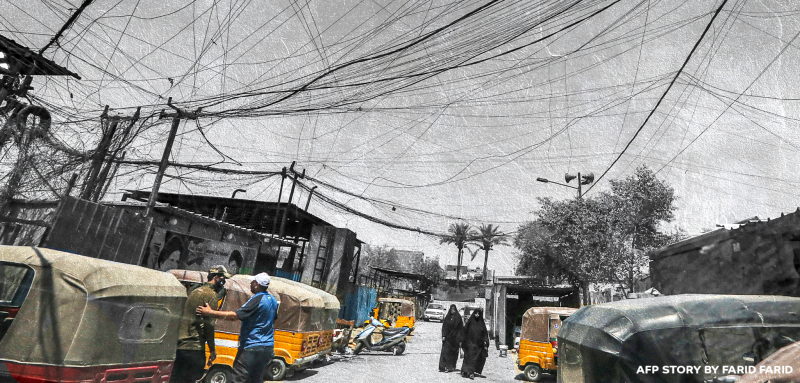Amid a significant rise in temperatures in the Middle East, Iraqis are suffering from frequent power cuts. The power outages come as a result of the lack in the gas needed to operate power plants, after Iran reduced the gas supply quotas that had been assigned to Iraq.
Darkness reigned over many Iraqi provinces, including the Saladin Governorate, after “terrorists” blew up several massive transmission towers, which caused widespread power outages.
On Sunday, August 8, the state-owned Electricity Transmission Company announced the suspension of a power line feeding the Mosul governorate after it was subjected to an “act of vandalism”.
The Iraqi Ministry of Electricity said in a statement issued last Thursday (August 5th) that “terrorist operatives” used “improvised explosive devices” and carried out attacks on a total of 13 towers within 48 hours. The Iraqi authorities then published photos showing the damaged towers.
In its statement, the ministry explained that, “The series of explosions targeting electric power pylons (towers) has reached the ones between the northern and western regions,” adding that its goal is to separate the national system between the governorates, bring an end to the projects of the Ministry of Electricity, deplete its capabilities and potential, and exhaust its infrastructure.
Iraq is one of the countries where demand exceeds supply, since the grid’s production of electricity is not enough to cater to the needs of the residents, causing long and frequent outages in hospitals and government buildings.
Electricity in Iraq
Iraq is one of the countries where demand surpasses and exceeds supply, since the national grid’s production of electricity is not enough to cater to the needs of the residents and the citizens. This causes frequent and lengthy outages in hospitals, government buildings, and even local airports, which often remain without electricity for long periods of time.
Oil-rich Iraq produces only 16,000 megawatts of electricity per day, while the daily demand there reaches up to 24,000 megawatts, which means that Iraq currently produces less than half of its electricity needs.
The current population of Iraq is expected to double by 2050, which means an increase in its electricity needs, according to the United Nations.
Every summer the Iraqi government promises to do better. In December 2020, a parliamentary committee set up to investigate the conditions of the electricity sector reported that $81 billion US dollars had been spent on the sector since 2005. Yet, there have been no significant improvements.
Suspicions of Corruption
A study conducted in October 2020, suggested that local residents spent $4 billion US dollars on private generators in 2018, and that there is a huge business and trade in generator companies that have close ties to politicians and militia leaders, according to German media broadcaster Deutsche Welle (DW).
Iraqis spent $4 billion on private generators in 2018 There is substantial trade in generators, closely tied to politicians and militia leaders
Iraq buys gas and electricity from neighboring Iran to suffice about a third of its needs from the energy sector, which had collapsed during the many years of conflict, poor maintenance, and corruption, and is unable to meet the needs of the country’s 40 million people.
From time to time, Iran suspends its gas and electricity exports, due to Iraq’s failure to pay its debts, which have amounted to about $6 billion US dollars due to financial crises and US sanctions.
The United States blacklisted the Iranian energy industry in late 2018 and imposed sanctions on it, but it granted Baghdad a series of temporary exemptions so that it could deal with Tehran within the field of electricity, in the hope that Iraq could gradually give up Iranian energy, which is something that has not happened so far.
Last June, Bloomberg reported that Iraq was developing a $40 billion dollar plan to build a nuclear plant to end the blackouts and power outage crisis that has sparked social turmoil and unrest.Raseef22 is a not for profit entity. Our focus is on quality journalism. Every contribution to the NasRaseef membership goes directly towards journalism production. We stand independent, not accepting corporate sponsorships, sponsored content or political funding.
Support our mission to keep Raseef22 available to all readers by clicking here!
Interested in writing with us? Check our pitch process here!





